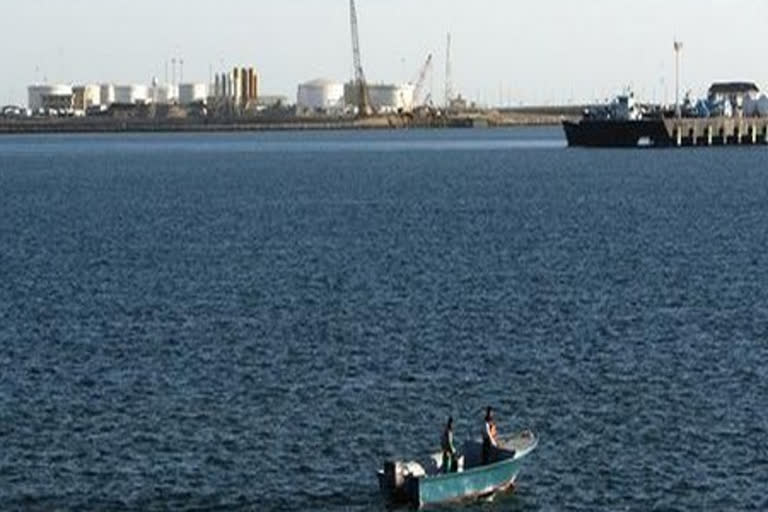New Delhi: A historic deal called the “Comprehensive Strategic Partnership" agreement, valued at about $400 billion and valid for 25 years, was signed on Saturday (March 27, 2021) in Tehran between Chinese foreign minister Wang Yi and his Iranian counterpart Mohammad Javad Zarif, could cast its long and dark shadow on India’s already beleaguered Chabahar project in Iran.
Details of the deal—the crux of which is a promise of huge Chinese investment in Iran in return for regular supply of Iranian oil at discounted rates and military arrangements among other fields of cooperation over a 25-year period—are still shrouded in secrecy.
There were unconfirmed reports that China may station up to about 5,000 troops in Iran to protect Chinese investments and interests.
After this deal with China, Iran is looking ahead to another similar deal with Russia.
Chairman of the Iranian Parliament's National Security and Foreign Policy Committee Mojtaba Zonnour recently said that Iran is seeking a similar agreement with Russia in order to overcome US sanctions and to “ditch the dollar”.
Zonnour said: “We are looking for joint cooperation and bilateral interaction with these countries in the field of rail services, roads, refineries, petrochemicals, automobiles, oil, gas, gasoline, environment and knowledge-based companies because this can play a very effective role in neutralizing foreign sanctions.”
Also read: Under shadow of 'secret' Iran-China pact, India left out of Chabahar rail project
Chabahar Project
India was to construct two terminals with five berths at Iran’s strategic Chabahar’s Shahid Beheshti area which would have been part of a transit corridor that will enable trade access to Afghanistan, Central Asia and even to Russia.
The two terminals were a 600-metre cargo terminal and a 640-metre container terminal. The 628-km-long railway line would have connected Chabahar with the Afghanistan border town of Zahedan.
The development is very significant and indicates the formation of a China-Russia-Iran axis at a time when India is getting co-opted into the US camp along with the positioning of the ‘Quad’ which comprises India, US, Australia and Japan.
India’s relations with China are at the nadir with the two Asian giants engaged in a series of military face-offs in eastern Ladakh that is yet to be fully resolved.
Because of growing proximity to the US, India’s traditionally warm ties with Russia have also taken a hit.
Recent reports speak of Russia having blocked India’s seat at the high table to deliberate and resolve the Afghanistan issue as it would mean strengthening US.
India-Iran Ties
Historically, India’s Iran ties have been very close in the backdrop of cultural commonalities.
Politically, Iran was India’s strongest ally in the West Asia region with a perceived Indian ‘tilt’ in the Saudi-Arabia headquartered Organisation of Islamic Cooperation (OIC), the successor of the Organisation of the Islamic Conference.
Moreover, Iran with huge assets in both Afghanistan and Pakistan, was the veritable hinge for Indian interests to flourish in Afghanistan which was the Gateway to Central Asia where India had always looked for strong presence. In fact, India’s presence in the Chabahar project was to help access Afghanistan and Central Asia bypassing Pakistan.
Also read: Iran drops India from Chabahar rail project as it OKs major deal with China
Economically too Iran was willing to sell petrol to India in Indian currency. But because of US sanctions, India had stopped buying of Iranian oil and instead started buying US oil, thereby distancing Iran.
The widening gulf also led to an unprecedented and vehement protest by Iran on India’s abrogation of Article 370 in Kashmir.
On the other hand, China and Iran linkages have grown much stronger on account of the US sanctions. With most countries abhorring Iran oil for fear of attracting provisions of the US sanctions that include seizures of oil tankers carrying Iran oil and being cut off from the ubiquitous US banking system, China has taken the US sanctions head on.
An economically-hit Iran brought down its oil rates that China has lapped up.
According to a Reuters report, it has resulted in China buying record volumes of Iranian oil even as crude oil shipments from Iran are “causing congestion at ports and filling up storage tanks”.
With growing proximity of the China-Russia-Iran nexus, and with India’s gulf widening with these countries, the prospects of Indian interest flourishing at Chabahar look increasingly grim.



